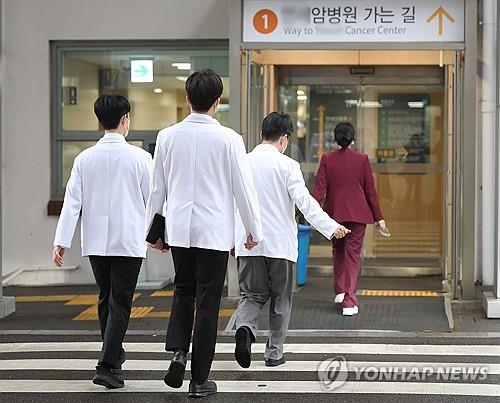- California Assembly OKs highest minimum wage in nation
- S. Korea unveils first graphic cigarette warnings
- US joins with South Korea, Japan in bid to deter North Korea
- LPGA golfer Chun In-gee finally back in action
- S. Korea won’t be top seed in final World Cup qualification round
- US men’s soccer misses 2nd straight Olympics
- US back on track in qualifying with 4-0 win over Guatemala
- High-intensity workout injuries spawn cottage industry
- CDC expands range of Zika mosquitoes into parts of Northeast
- Who knew? ‘The Walking Dead’ is helping families connect
Over 70 pct of trainee doctors submit resignations in protest of plan to boost medical students
More than 70 percent of trainee doctors have submitted their resignations in protest of a plan to boost the number of medical students, officials said Wednesday, with the government ordering about 6,000 of them to return to work.
Concerns have heightened as doctors and the government were in a collision course over the plan to raise the medical school admission quota by 2,000 seats next year.
As of Tuesday, a total of 8,816 trainee doctors, or 71.2 percent of the junior doctors, had submitted their resignations and 7,813 of them left their work sites, Second Vice Health Minister Park Min-soo told reporters.
Park said the government ordered 6,112 trainee doctors to return to work. So far, the ministry has received 92 complaints in connection with the trainee doctors’ collective resignations.
Trainee doctors showed signs of upping the ante in their confrontation with the government, as about 6,400 had submitted resignations as of Monday. There are some 13,000 trainee doctors in South Korea.
Surgeries have been canceled and some patients were forced to be transferred to other hospitals as trainee doctors stopped working for the second day in a row Wednesday.
“The trainee doctors’ right to take collective action cannot have precedence over people’s basic right to life,” Park said.
To cope with a potential disruption to medical services, the government has extended operating hours at 97 public hospitals and opened emergency rooms at 12 military hospitals to the public.
Despite the government’s back-to-work order, trainee doctors have shown no sign of backing down.
In a statement, the Korean Intern Resident Association, a major organization of trainee doctors, demanded the government withdraw the plan to increase the number of medical students.
Describing the plan as “ridiculous,” the association criticized the government for treating trainee doctors as “criminals by overusing extrajudicial executive orders.”

The government says the increase in the admission quota is needed to address a shortage of doctors, particularly in rural areas and essential medical fields, such as high-risk surgeries, pediatrics, obstetrics and emergency medicine.
The number of doctors in South Korea relative to the size of the population is among the lowest in the developed world, according to health authorities.
But doctors have claimed that the government has not had full consultations on the matter and that the move will compromise the quality of medical education and services.











